Collective effort of a nation overcame Japanese aggression
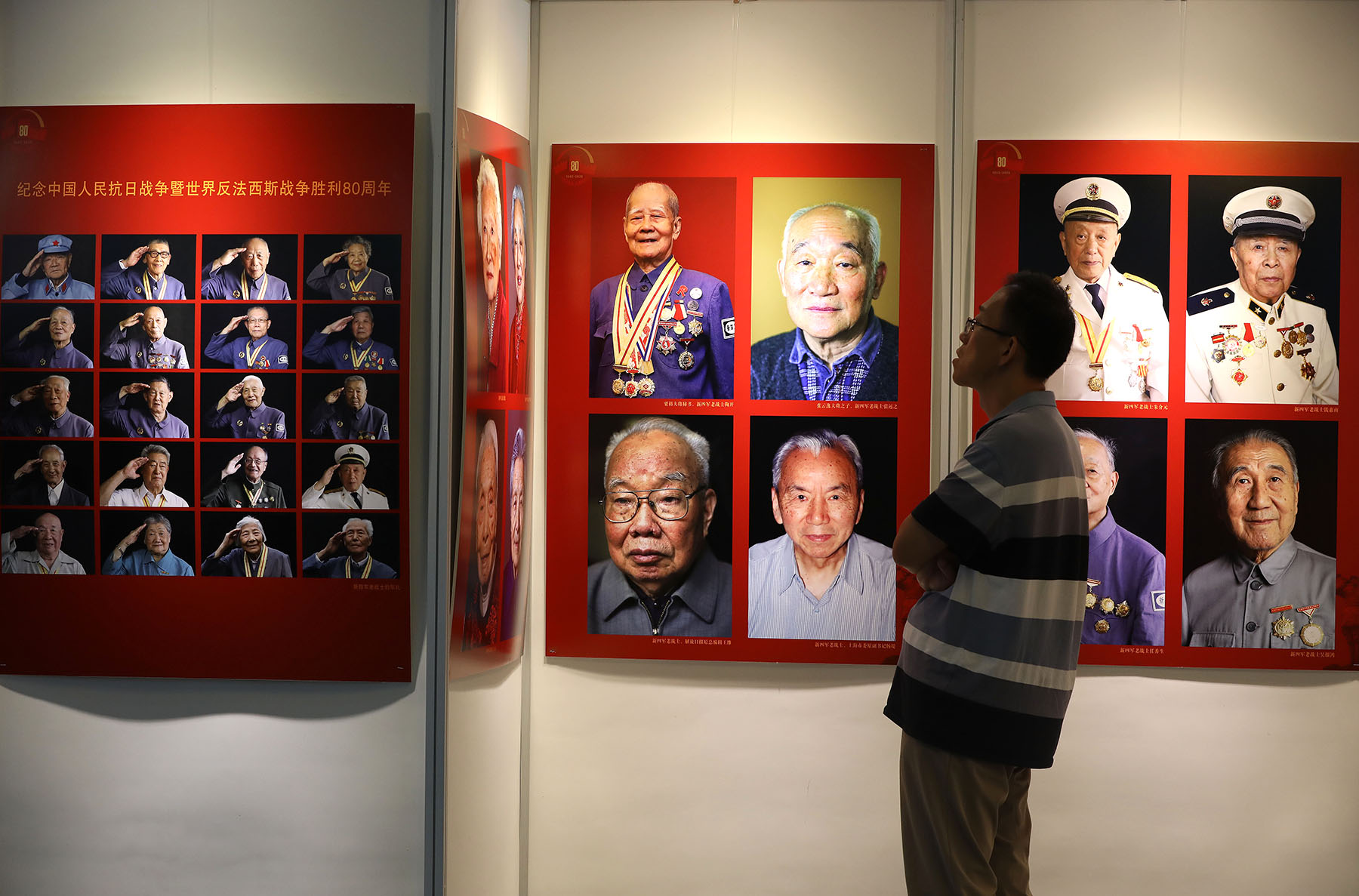
The voice of 94-year-old Zhang Kexia fills the room as she sings March of the Big Sword. This powerful anthem, heard across battlefields eight decades ago, still resonates as China commemorates the 80th anniversary of victory in the Chinese People's War of Resistance Against Japanese Aggression (1931-45).
"Swing your broadswords at the enemy's heads! Compatriots across the nation, the day of resistance has come," she sings.
More than 80 years on, she still knows the lyrics by heart and sings the song with passion and conviction. Her song serves as a direct link to the generation that endured the conflict.
READ MORE: 35 years of ensuring global stability via sincerity, strength
Zhang, who was born in 1931 in Sihong county, Jiangsu province, joined the art troupe of the New Fourth Army, which was led by the Communist Party of China, at the age of 13. The troupe was an artistic unit highly respected in the army, she said.
"When we were on the move, we'd compose kuaiban (bamboo clapper rhythms), paint slogans and sing songs to lift spirits," she said. "We girls were just teenagers, but had to carry a 5-kilogram backpack and another 4-kg rice bag. When the fighting got intense, I was given two grenades."
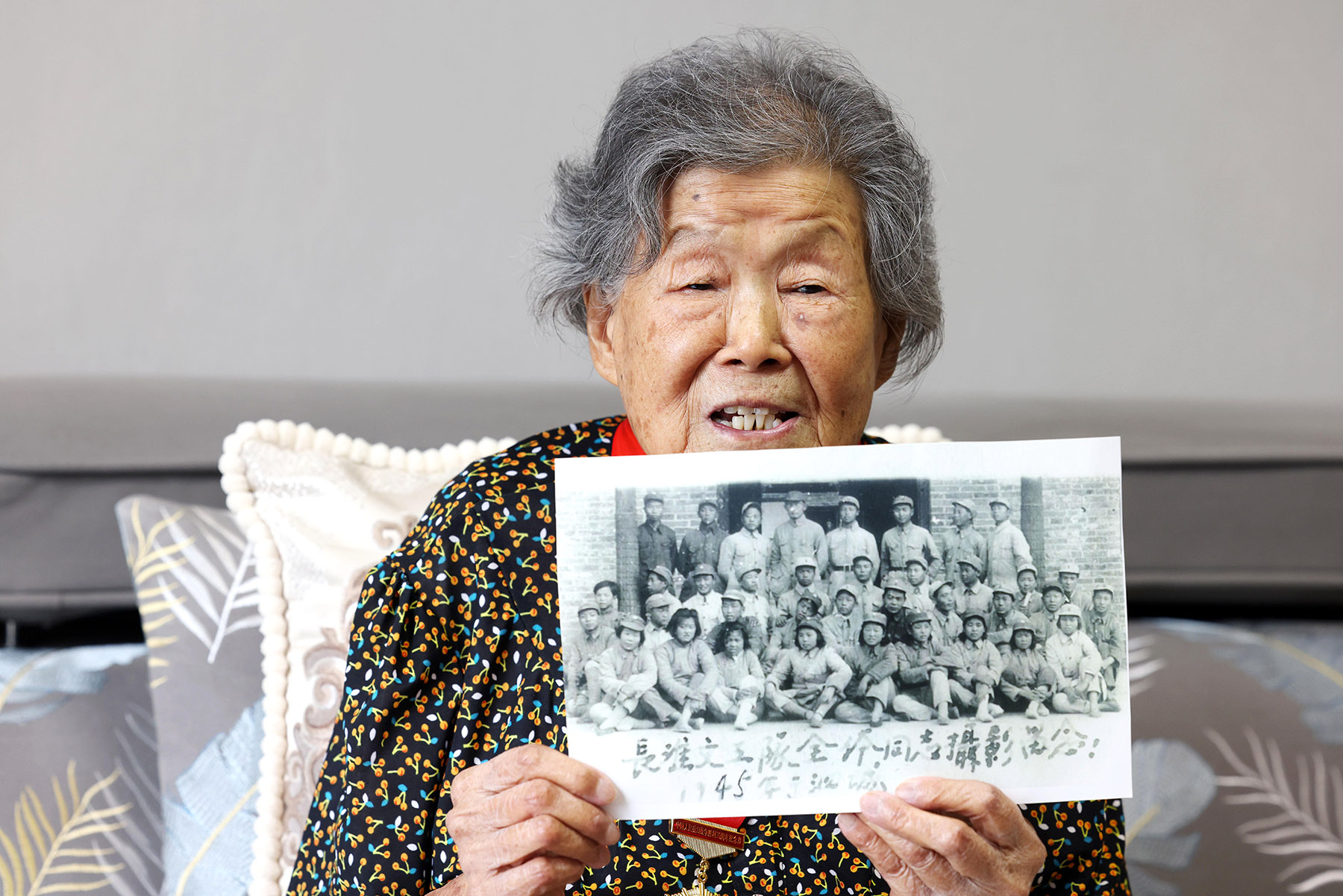
She emphasizes the fundamental reason they fought: "Back then, we were on the verge of becoming a conquered people. We won because the entire nation fought with blood and sacrifice."
At 100 years old, veteran Cui Gong vividly recalls joining the Eighth Route Army, another CPC-led military force, in 1942 during the intense Japanese invasion of China. "It was around June or July," said Cui, originally from a village in Pinglu county, Shanxi province.
He was only 14 or 15 years old when he was drawn to the army's publicity efforts promoting the Party's policies. "Children like us formed the Children's Corps," Cui recalled. Recruits were typically aged 15 to 18.
"The conditions were tough. We lacked weapons; even veterans carried old rifles," Cui said.
"The Japanese had Type 38 rifles. We sometimes used sorghum stalks, shaped to resemble bullets and inserted into cartridge belts, making them look loaded when they weren't."
Cui served with the Eighth Route Army through its most difficult period until Japan's surrender in 1945. "The commander informed us, 'Japan has surrendered'. You will be transferred to your local jurisdiction," he said. "People were overjoyed, embracing with hoes in hand. Oh, what happiness."
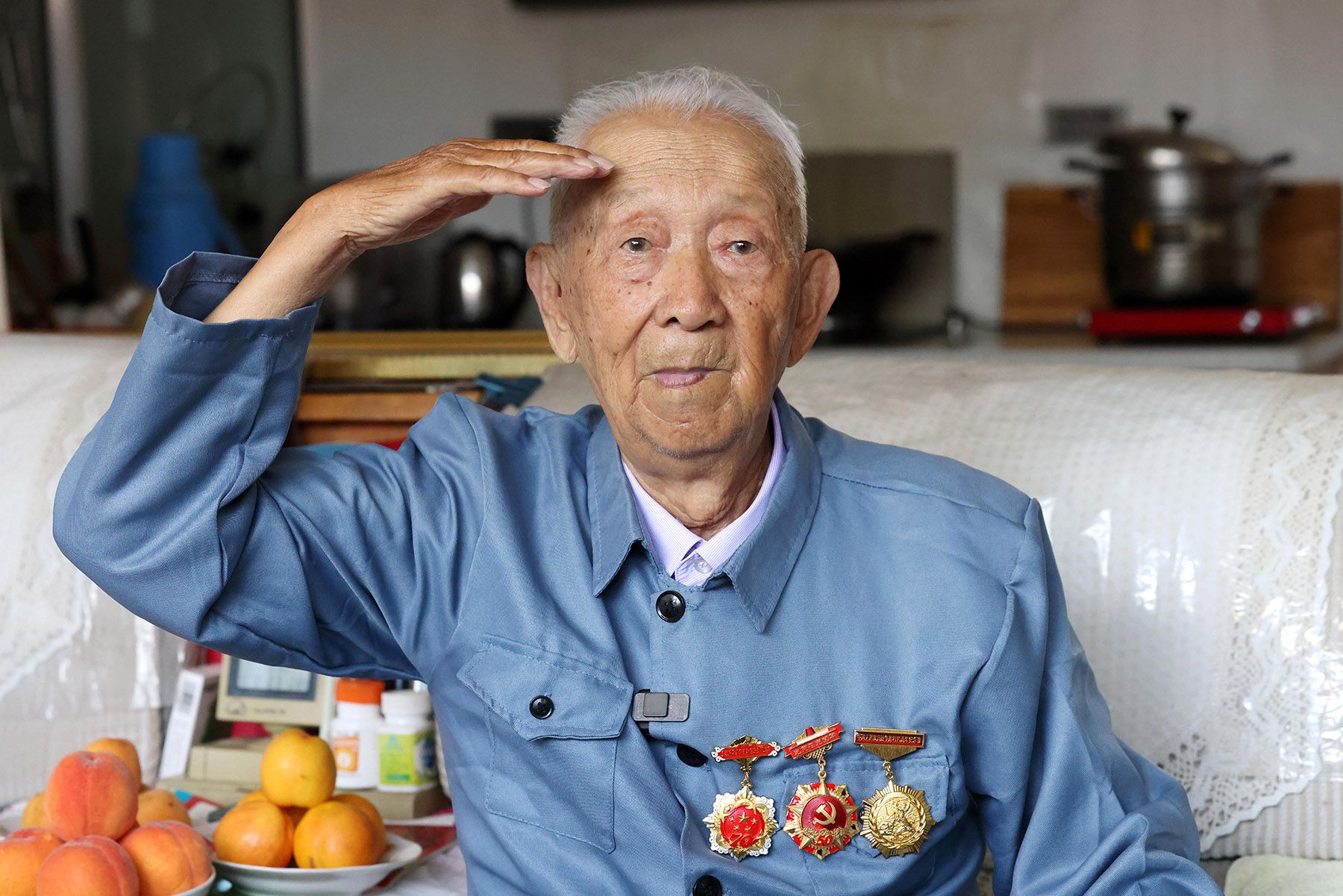
Born on June 27, 1927, in a village of Liulin county, Shanxi province, 98-year-old veteran Li Qing joined a guerrilla force at 16. He participated in the war of resistance against Japanese aggression, the War of Liberation (1946-49), and the War to Resist US Aggression and Aid Korea (1950-53). After transferring to civilian work in 1964, he worked on a section of the Zhongyang Highway in Shanxi until retirement in 1987.
"I became a soldier to resist Japanese aggression and save China. If anyone dares to bully China, we will deal with them," Li said.
In 1942, 15-year-old Li fled across the Yellow River from Linxian county in Shanxi to a village in Shaanxi, working at a textile factory.
Along the way, he witnessed displaced compatriots and heard of horrific atrocities. To escape Japanese troops, villagers hid in cellars or in the mountains, stifling children's cries to avoid detection — sometimes discovering too late that the child had suffocated, he said.
Li recounted the tragedy of his aunt's neighboring village where the residents were discovered hiding in a cave. Japanese soldiers sealed the entrance and pumped in smoke, killing everyone inside.
Driven by oppression and these horrors, Li joined the Eighth Route Army guerrillas, beginning his military career.
As part of the poorly equipped guerrillas, they fought the Japanese under the tactics of "enemy advances, we retreat; enemy retreats, we advance; enemy tires, we fight; enemy flees, we pursue".
He recalled some significant engagements during the war.
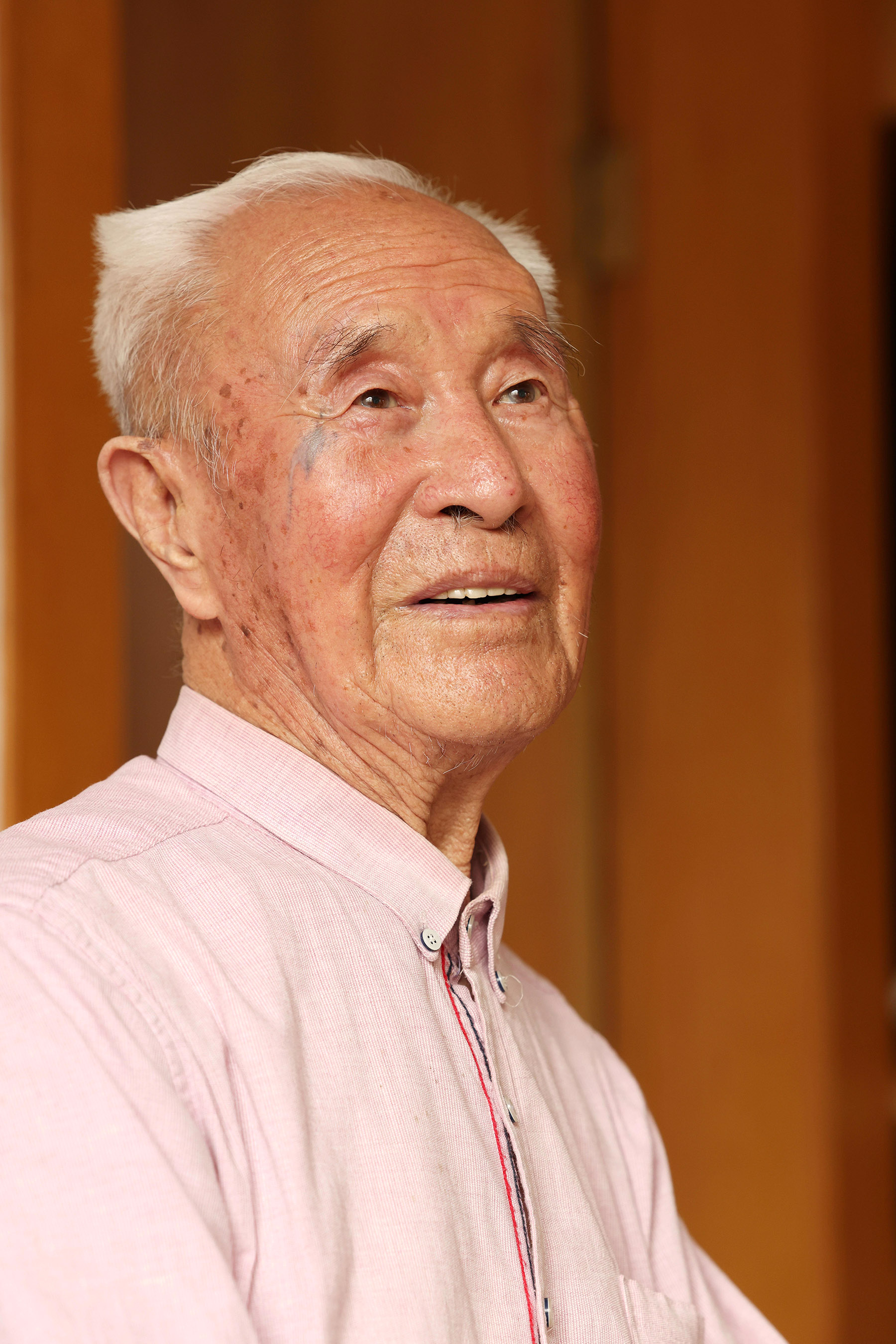
During the Guanzhuangyuan Battle in 1943, after intense fighting near a local village, the guerrillas were forced to withdraw.
However, during the Lijiayuan Battle, also in 1943, the guerrillas attacked a Japanese bunker at dusk with only 10 or so defenders. They killed five, captured three and seized weapons. This victory earned recognition from Chairman Mao Zedong, with an art troupe performing for three days in Liulin county to celebrate the victory.
Yang Ronghua, born in April 1927 into a poor peasant family in Wutai county, Shanxi, joined the village's theater troupe as a child.
His primary task was writing slogans such as "Down with Japanese Imperialism", "Eliminate Traitors and Collaborators", "Expel Japanese Imperialism from China", and "Save China's Future".
The troupe operated effectively, even performing at the county level. Within a month, 120 outstanding young people from the village enlisted in the army.
Yang later joined the guerrilla forces, standing guard and planting landmines.
He described a perilous mission in the autumn of 1943. The Japanese invaders came out of their watchtower. They carried two landmines and detonators. Following their comrades, they marched on while scouting enemy movements, he said.
During this operation, at one point, they were completely exposed in a massive open area.
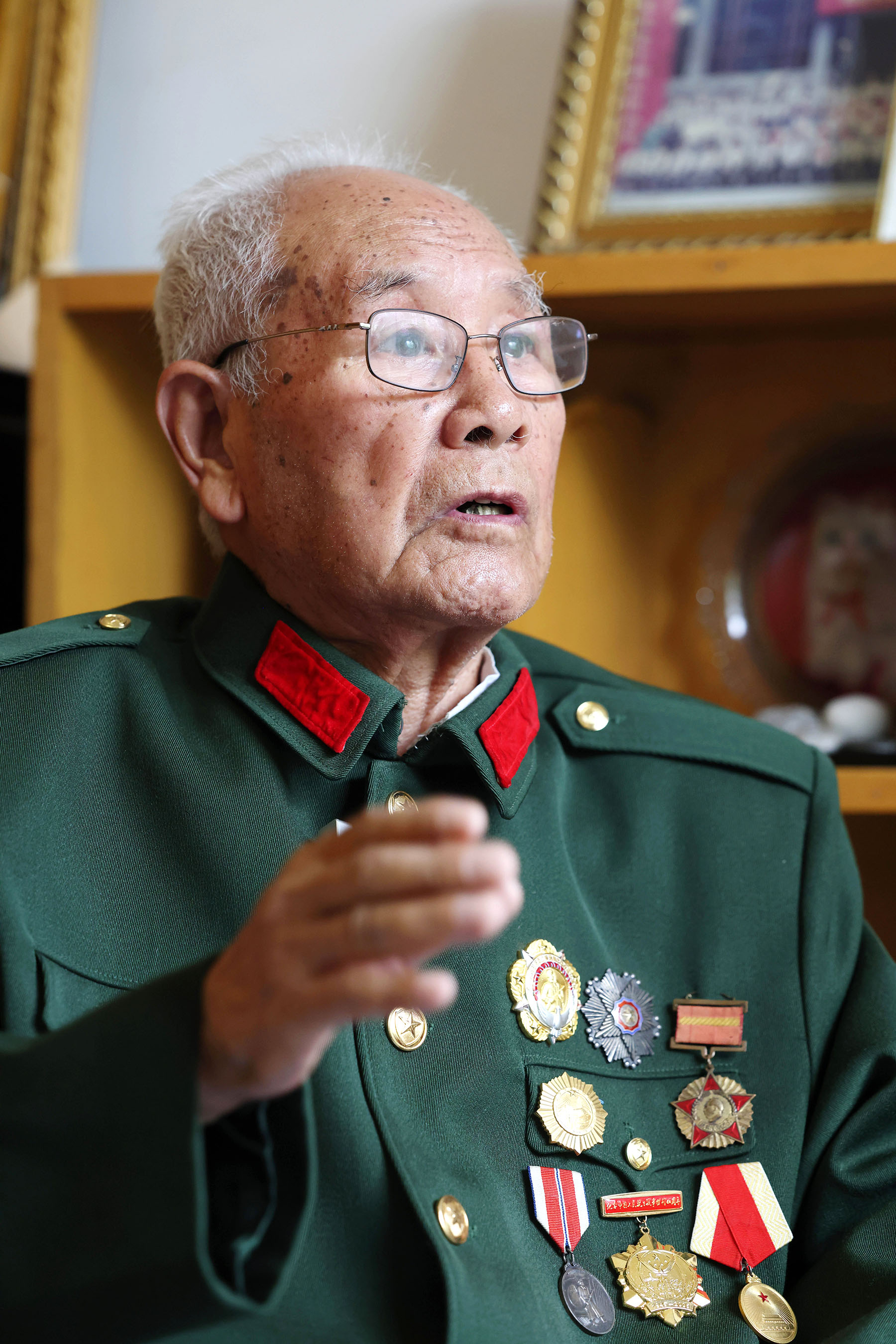
"Bullets whizzed past me, whistling overhead and zipping past my feet; some of them came very close to my leg. Among the nine of us, two were killed," he said.
"These passionate young men fought fiercely against the Japanese imperialist aggression and tried to stop the enemy from seizing grain. Their spirit was noble. We should always remember them and pay tribute."
Veteran Wen Yunfu, 96, born in a village in Hebei province, joined the Eighth Route Army in 1945.
Life under Japanese oppression was unbearable, he said. He was assigned to an arsenal in Shijiazhuang, Hebei province, primarily tasked with manufacturing landmines, grenades and repairing weapons.
Japanese invaders arrived in his area in 1937. "They went into every village, burning, killing and looting," Wen recalled, describing the implementation of the "Three Alls" policy: "Burn All, Kill All, Loot All".
With no alternative, civilians fled. "One day, we ran several kilometers away and saw smoke rising from our village. After the Japanese invaders left, we returned to find our houses burned down," he said.
The Japanese soldiers killed many people in neighboring villages, throwing civilians' bodies into wells. The people were truly enslaved, he said.
Speaking of the suffering, he choked up before urging unity, "Come, come, we must unite as one, resist unto death, and overthrow Japanese imperialism." Recalling Japan's surrender, Wen said, "Everyone was, of course, beyond happy."
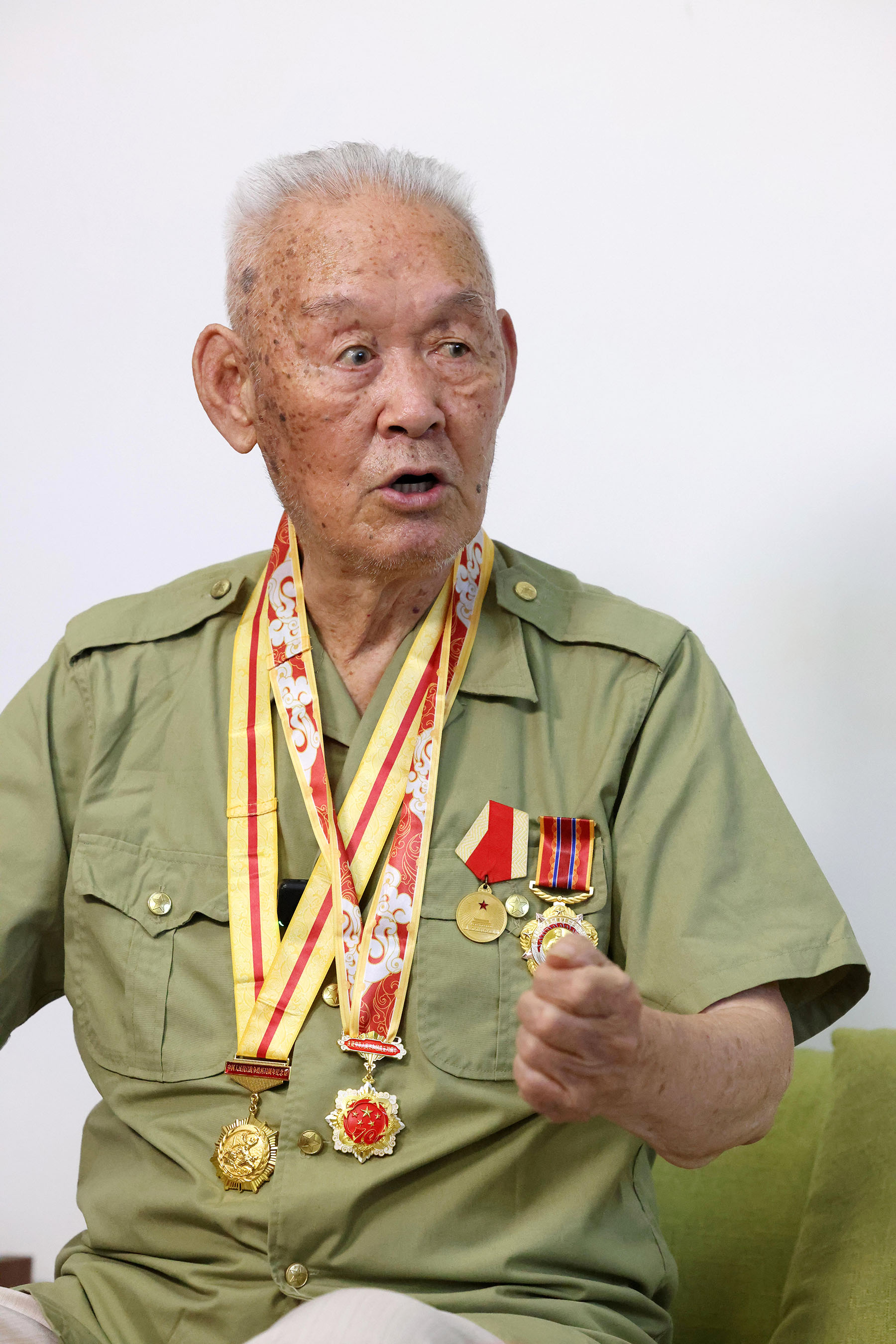
Shaping families
The veterans' experiences profoundly shaped their families' lives and values.
Cui Gong's wife, Shen Yuying, said their children's names embody patriotic hopes. Her first son Cui Jianping (establish peace), was followed by Jianzhong, Jianhua — combining to form "Zhonghua" (China). "Their names entrust our hopes for the nation's prosperity. Our thriving country and improving lives fill us with pride," Shen said.
Li Qing's daughter, Li Lianping, 55, described her father's enduring military discipline, where he would rise at 5:30 am and be in bed by 8:30 pm daily. During the day he'd tend his garden.
Though his mobility and memory have declined at 98, his routine persists, Li Lianping said. His main pastime remains watching news and weather reports. "They were pure revolutionaries, sacrificing themselves for the public good. This spirit, ingrained in them, subtly influences us," she said, expressing regret at not fully recording his fading war stories. She emphasized learning from veterans' unwavering faith, selfless dedication, hard work and sustained military conduct.
"Young people born in the new era have their own duties and missions. But loving the motherland and striving for its development and strength are essential qualities for every Chinese citizen," she said.
Wen Yunfu's son, Wen Taisheng, a retired railway worker, said his father enjoys the simple thing in life. He gets up early to go shopping, enjoys food and coffee, takes a nap after lunch, and has a little drink before bed.
His father rarely speaks about his wartime experiences due to the painful memories — his home burned, his uncle martyred, and he'd received chemical burns, Wen Taisheng said. Recounting them causes great distress, agitation and tears, he added.
As a father, Wen Yunfu was a strict disciplinarian, enforcing "100 percent positive" education to guard against societal ills, deeply influencing his children through his own conduct such as not smoking, Wen Taisheng said.
Peace and remembrance
Despite enduring depths of suffering, the veterans share resolute hopes for China's future rooted in remembrance and peace.
Contrasting past hardships, Wen Yunfu said: "Life is much better now. No lack of food or clothing. This is a strong country." Marking the 80th anniversary of both the victory and his own CPC membership, he credited the Party: "Under its leadership, lives gradually improved. Today's happiness was unimaginable in my childhood. May our motherland prosper, and everyone live happily."
ALSO READ: Unit 731 atrocities a deep wound that can't be forgotten
On the anniversary, Cui Gong expressed pride, "China is strong now, thriving and prosperous. May our motherland enjoy eternal peace and prosperity."
Yang Ronghua highlighted the anniversary's significance, saying "We should be grateful for all Chinese people's efforts and international allies' assistance. Study the war's history, understand past oppression, remember our history, and commemorate the sacrifices."
Contact the writers at zoushuo@chinadaily.com.cn


